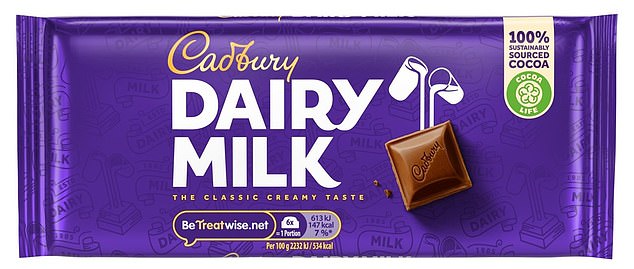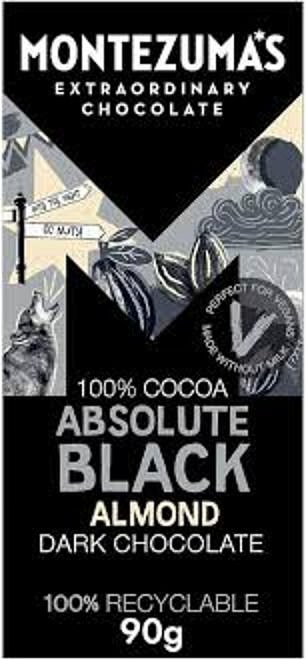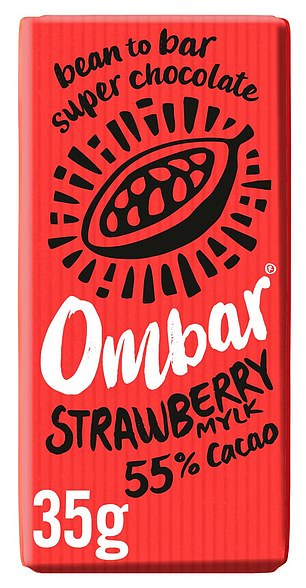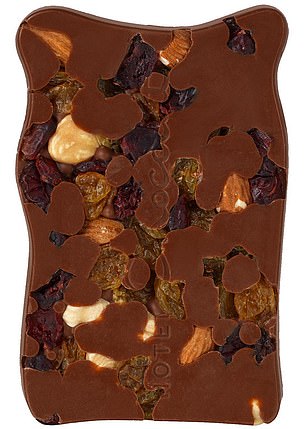Which chocolate bar is the healthiest? I am an expert in losing weight and this is the one I would choose











According to data company Mintel, we spent an estimated £7 billion on chocolate in the UK last year. That’s around £105 for every adult and child in the country.
If you like to grab a sweet treat when you pay for petrol, or pop a multipack in your shopping basket, read on. The bar you choose, from dark to milk or white, can make a big difference to your health and your waistline.
We asked Lucy Diamond, a dietitian at oviva.com – an NHS approved online resource for weight and health management – to review ten popular products, which we then rated.
DAIRY MILK

45g, 85p, most supermarkets.
Per 100 g: calories, 534; saturated fat, 18 g; protein, 7.3 g; fiber, 2.1 g; sugar, 56 g; salt, 0.24 g
Milk may be the first ingredient on the list, but as with all chocolate treats, you also have to watch the sugar and fat.
With 56 percent sugar content, you’re getting the equivalent of six teaspoons of sugar in a small 45g bar. While some of the sweetness comes naturally from the milk, a significant portion will be ‘free’ sugar – which is bad news for our waistlines and teeth.
The cocoa butter and vegetable fats in this bar, including palm and shea butter, mean that there are 8.1 grams of saturated fat in a bar. That’s just over 40 percent of the daily limit for women and almost a third of the daily limit for men.
Like most milk chocolate, this one contains just 20 percent heart-healthy cocoa solids. And with 240 calories in a bar—the equivalent of three and a half digestive biscuits—you’re best off eating a few squares at a time.
HEALTH ASSESSMENT: 3/10

MONTEZUMA’S ABSOLUTE BLACK ALMOND
90 grams, £2.97, montezumas.co.uk
Per 100 g: calories, 606; saturated fat, 29 g; protein, 14 g; fiber, 16 g; sugar, 3 g; salt, 0.01 g
With just two ingredients – dark chocolate and almonds – and no added sugars, this bar is about as healthy as chocolate can get.
The 100 percent cocoa solids are a good source of flavanols, plant compounds with powerful, protective antioxidant properties that have been linked to a lower risk of heart disease. You’ll also get heart-healthy unsaturated fats from the almonds, which are rich in vitamin E, potassium, calcium, and magnesium, all important for cardiovascular health. Both ingredients are also good sources of gut-friendly fiber—you’ll get 16 percent of your daily needs in a serving—and 4.2 g of protein (the equivalent of half a large egg), a combination that should make this chocolate more satisfying than most.
But it’s still high in saturated fat (mostly from the cocoa) and with 181 calories in a third bar (about the same as a small croissant), it’s a reminder that all chocolate is best eaten in small amounts and only enjoyed as an occasional treat.
HEALTH RATING: 9/10

MARS BAR
51g, 80p, most supermarkets.
Per 100 g: calories, 448; saturated fat, 8.1 g; protein, 4.5 g; fiber, n/a; sugar, 60 g; salt, 0.40 g
Sugar and corn syrup are the first two ingredients listed, so it seems likely that much of the sweetness comes from added ‘free’ sugar – the kind that’s bad for your waistline and teeth. You get a whopping 30.6g of sugar, just over seven and a half teaspoons, in this bar.
And with 228 calories (slightly more than you’d get from three Digestives), very little cocoa solids, and a sticky caramel-nougat filling that can get stuck on your teeth, it’s hard to find nutritional benefits in a Mars bar. It’s all about the pleasure of eating it.
If you’re a fan, you’ll want to opt for the smaller ‘Fun size’ bars. These are 65 percent smaller than a regular bar, at 18 grams each, and contain 11.1 grams of sugar (just under three teaspoons each).
HEALTH RATING: 1/10

OMBAR STRAWBERRY MIST
35 grams, £2.10, ocado.com
Per 100 g: calories, 603; saturated fat, 31 g; protein, 6.2 g; fiber, n/a; sugar, 28 g; salt, 0.1 g
This small, 35g dairy-free bar is made with 55 percent cocoa. Cocoa is made from unroasted cocoa beans and is said to retain more of their antioxidant polyphenols (protective plant chemicals), which have been linked to lower blood pressure and improved blood sugar control.
Cocoa is also a source of minerals, including manganese, which is important for building connective tissue, bones and blood clotting factors.
There’s far less sugar in this bar than most – about half the amount you’d get in an equivalent serving of Dairy Milk, say two and a half teaspoons. Some of that comes naturally from the powdered strawberries here and other ingredients, but some is from added coconut blossom sugar – which, while sounding healthy, is no better for you than regular table sugar. And despite only having six minimally processed ingredients, a third of this pricey bar is saturated fat, from creamed coconut and cocoa butter, which isn’t great for your heart.
HEALTH RATING: 7/10

CURLY WURLY
21.5g, 25p, most supermarkets.
Per 100 g: calories, 454; saturated fat, 9.3 g; protein, 2.1 g; fiber, 0.7 g; sugar, 50 g; salt, 0.66 g
At 21.5 grams—less than half the size of a Mars Bar—this chocolate and caramel treat contains just 98 calories and just under three teaspoons of sugar. And the upside of it having caramel is that it takes a while to eat, extending the enjoyment of this sweet little treat.
But the chewy caramel filling is not good for your teeth. It can put pressure on fillings and the sticky texture can cause the sugars to stick to your teeth.
This bar also contains a lot of ultra-processed ingredients, including whey permeate powder (a milk extract), emulsifiers, an acidity regulator and a stabilizer. It’s good that this bar is smaller and lower in calories than most, but you certainly won’t get any health benefits from it.
HEALTH RATING: 2/10

HOTEL CHOCOLATE FRUIT AND NUT CHOCOLATE SELECTOR
100 grams, £4.95, hotelchocolade.com
Per 100 g: calories, 530; saturated fat, 17.2 g; protein, 7.2 g; fiber, 3.9 g; sugar, 45.8 g; salt, 0.1 g
This milk chocolate bar is made from 19 percent dried fruit (raisins and cranberries) and 10 percent nuts (almonds and hazelnuts), nutritious, fiber-rich plant ingredients that help improve the diversity and health of your gut bacteria.
The chocolate itself is a simple blend of 40 percent cocoa solids (almost double that of most milk chocolate treats), sugar, and whole milk powder — without the long list of additives and refined ingredients you’ll find in some other bars.
Half a bar contains 23 grams of sugar, almost six teaspoons. Some of that comes naturally from the dried fruit and milk powder, though, meaning you’re getting some beneficial nutrients, too.
The best way to eat chocolate, even good quality like this, is in very small portions. Ideally a few squares as a treat.
HEALTH RATING: 8/10

REESE’S PEANUT BUTTER bar
90g, £1.60, available from most supermarkets.
Per 100 g: calories, 550; saturated fat, 16 g; protein, 6.9 g; fiber, n/a; sugar, 54 g; salt, 0.51 g
This sugary, calorie-packed bar contains many highly processed ingredients.
The nutty filling is described as “peanut butter cream” and is a blend of 13 ingredients, including hydrogenated vegetable oil (oil that has been processed so that it becomes solid at room temperature).
The outer layer is a ‘milk chocolate flavour coating’, again a mixture of 13 ingredients, several of which are artificial additives.
This bar contains just over 12 teaspoons of sugar and 495 calories, which is the equivalent of a large meal, so you can safely eat a piece.
HEALTH RATING: 1/10

KIT KAT VEGAN
41.5g, £1, available from most supermarkets.
Per 100 g: calories, 515; saturated fat, 18.2 g; protein, 2.7 g; fiber, 9.8 g; sugar, 34.3 g; salt, 0.16 g
This new vegan version of Kit Kat is the same size and weight as the regular four-finger bar.
The dairy ingredients in the original version – including whole milk and whey powder – have been replaced with corn fibre, cocoa powder and rice. This means this option has less sugar (three and a half teaspoons of sugar compared to just over five teaspoons) and four times the filling fibre – you’ll get 13 percent of your daily fibre needs in this bar – compared to the original Kit Kat.
It’s still quite high in calories: a whole bar has 214 calories – the equivalent of three digestive biscuits, with more than twice the sugar. Consider splitting this bar with a friend if you’re watching your weight.
HEALTH RATING: 5/10
LINDT EXCELLENCE WHITE – A TOUCH OF VANILLA

100g, £2.15, most supermarkets.
Per 100 g: calories, 571; saturated fat, 22 g; protein, 4.8 g; fiber, n/a; sugar, 57 g; salt, 0 g
There are no cocoa solids (the “healthy” part of the cocoa bean that provides bitter chocolate flavor, antioxidants, and fiber) in white chocolate. Instead, the creamy texture and flavor comes from cocoa butter – the fatty part of the bean, which is then mixed with sugar, milk solids, and vanilla to give it flavor.
Cocoa butter is about 60 percent saturated fat, which is not good for heart health.
White chocolate has no health benefits unless nuts, cacao nibs or something similar are added to it. So eat it in small amounts and as a snack.
Good quality pure chocolate with nuts is always the best option.
HEALTH RATING: 0/10

TONY’S CHOCOLONEY MILK CARAMEL BISCUIT
180g, £3, most supermarkets.
Per 100 g: calories, 528; saturated fat, 18.1 g; protein, 7.3 g; fiber, n/a; sugar, 48.9 g; salt, 0.23 g
There is a fair amount of antioxidant-rich cocoa solids in there – at least 32 percent – which is quite high for a milk chocolate and indicates taste and quality. The brand is also Fair Trade certified, meaning their cocoa beans are ethically sourced and sourced.
But there are quite a few processed ingredients in this bar, including corn syrup, dextrose, sweetened condensed milk, emulsifiers, and a stabilizer.
Like any bar with caramel or a sweet, sticky filling, this one has a high sugar content – almost 49 percent – but that’s still a sixth less than you’ll find in a Mars bar. You’ll get just under four teaspoons in the recommended 30g serving, and just over two digestive biscuits’ worth of calories.
HEALTH RATING: 5/10




